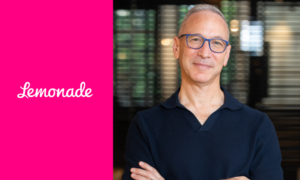Dr Karan Mehta wanted nothing more than to help heal patients at a practical level when he first embarked on his career journey.
But his experience in the healthcare sector made him rethink his future, as he saw patients return again and again with the same health issues, just months after treatment – with little or no improvement.
Following a conversation with a close relative, he realised that an alternative approach to health would better incentivise patients to adopt better lifestyle choices. The decision led him to course-correct, and in 2023, he launched Bluezone, the first insurtech to provide specialist term Life insurance to people suffering from diabetes.
Insurtech Insights caught up with him to find out more about Bluezone’s startup story.

Bluezone is offering a unique product, and was launched following your experiences as a young doctor working in the UK’s NHS. Can you tell us how it all began?
I started my medical career in the NHS, where I worked for three and a half years. From a young age, I knew I wanted to become a medical doctor, influenced by my older brother, a clinician, and my desire to positively impact people’s lives. My strength in maths and science made medicine a natural fit.
In medical school, I found the experience intellectually stimulating and fulfilling, knowing I was on a path to help people live healthier, happier, and longer lives. However, as I began practising, I quickly noticed the reactive nature of the healthcare system, focusing on treating symptoms rather than addressing root causes. Instead of guiding patients on diet or exercise, I often adjusted medication dosages.
It was disheartening to treat patients, discharge them, and see them return months later with the same issues because we weren’t addressing the root causes. This pushed me toward a more proactive approach to healthcare, which was challenging within the traditional NHS setting.
I completed my foundation years, rotating through various specialties for four months each. Soon, I realised this career path might not be the right fit for me, so I explored other opportunities.
For a couple of years, I balanced my work in startups and the healthcare technology space with my role as a senior house officer. I worked in wards like A&E, cardiology, and oncology, encountering many patients with chronic conditions. Around 70 to 80% were there due to complications from chronic illnesses, yet treatment often relied on medication rather than lifestyle changes.
How did you transition into the insurance business, especially given your passion for medicine?
My decision to leave the NHS didn’t happen overnight. Instead, it was a gradual realisation that developed during my foundation years as a junior doctor and my experiences of working in the healthcare technology space. I had many ideas that I wanted to pursue, but implementing them within the existing system proved challenging. Moreover, my impact was limited to the patients I saw on the wards, and I wanted to create something proactive that could positively influence millions of people globally.
To achieve this, I knew I needed to leverage technology and work within a commercial framework.
Joining an accelerator program in Berlin marked a turning point for me. During those three months, I was exposed to innovative developments in the life and reinsurance industry. I became excited about insurance because of its focus on understanding risk and the economic model, which is a shared value business model. If policyholders reduce the risk of negative events, it leads to fewer claims for insurers, making the insurer more profitable.
The alignment of incentives was what intrigued me most about the insurance industry, particularly in the areas of life and health insurance. This industry has the potential to offer proactive solutions and make a significant impact on people’s lives.
Demand for insurance among those with chronic conditions is high due to increased mortality risk and reduced life expectancy after diagnosis. However, the quality of products is lacking, with challenges in underwriting and access.
Dr Karan Mehta
Why did you decide to focus on diabetes as your starting block?
Currently, more than five million people in the UK have been diagnosed with diabetes, and some cases remain undiagnosed. Approximately 90% of these individuals have type 2 diabetes, while the remaining 10% have type 1 diabetes. This translates to about 6-8% of the UK population.
Additionally, people at the highest risk of developing diabetes are those with high body mass index (BMI) and obesity. We’re facing an obesity crisis in the UK and worldwide, where approximately one in three people – or 33% of the population – have a high BMI. This puts them at risk of developing diabetes, heart disease, or other chronic issues.
These conditions are not just chronic illnesses but chronic lifestyle diseases that can be managed through lifestyle changes. The positive news is that these risks can be addressed and potentially reversed through lifestyle interventions. Our plan is to launch a dynamic insurance product that takes a proactive approach to help individuals improve their health and re underwrites the policy based on these improvements. The reduction in risk and improvement in health could be translated into discounts in premiums, rewards and additional coverage.
This way, we aim to provide early personalised support and incentives to improve health outcomes. People with high BMI, high blood pressure, high cholesterol, smokers and diabetics will have access to this product.
But you also personally experienced the impact of diabetes on those seeking life insurance protection too. Tell us about that.
That’s right. While discussing my experiences in Berlin with my uncle, who has type 2 diabetes, he shared his struggles in securing life insurance. He faced multiple rejections, high quotes, and extensive medical paperwork, taking around two and a half years to get a policy. His frustrating experience, coupled with what I learned at the accelerator, revealed an opportunity to create products for people with chronic conditions like diabetes.
I began researching and talking to patients, others with chronic conditions, and insurance companies and brokers. I discovered two trends: chronic conditions are increasing, but insurance products for this population remain stagnant which is why these populations are classified as “underserved”. This led me to question whether the issue was due to a lack of demand or product quality.
Demand for insurance among those with chronic conditions is high due to increased mortality risk and reduced life expectancy after diagnosis. However, the quality of products is lacking, with challenges in underwriting and access. These insights prompted me to create Bluezone, aiming to improve insurance access and support policyholders in leading healthier lives.

What were the initial set up challenges you faced?
Despite my enthusiasm, I needed more experience and resources. So, I moved from Berlin to London and joined an insurtech accelerator as an entrepreneur in residence. This allowed me to build partnerships with insurance companies, including meeting our reinsurance partner and connecting with insurtech startups.
I also joined an insurtech startup for several months, admiring their approach to helping people live healthier lives. However, I wanted to focus on diabetes and chronic diseases while innovating in underwriting risk. This led me to pursue a master’s in health data science at UCL, where I learned to develop machine learning models.
Later, I pursued a PhD in health data science, gaining access to large electronic healthcare records. This enabled me to create a new machine learning method of underwriting risk for people with diabetes and other chronic illnesses. At the beginning of 2020, I raised the first round of investment, found my co-founder, and officially started Blue Zone.
Launching an insurtech company was challenging, requiring me to learn how to navigate the industry and establish credibility with insurance partners. Assembling the right team and demonstrating insurance expertise were crucial for success.
One major challenge arose when an insurance partner terminated our contract within three months due to internal issues in their organisation. We quickly secured a new insurance partner with the help of our reinsurer and relaunched without any interruption in our ability to sell insurance.
This difficult period tested our resilience and adaptability, ultimately strengthening Bluezone.
That’s quite a transition. Tell us more about what Bluezone can offer people who are chronically ill?
Our mission is to deliver proactive precision healthcare through insurance. Currently, we’re focused on making insurance more accessible and convenient for individuals with Type 2 Diabetes. People can access life insurance through our website anytime, filling out an online form quickly and privately, without speaking to a broker.
We offer a seamless online process that prioritises convenience, speed, and privacy. We aim to integrate behaviour change support, helping policyholders improve their lifestyles and potentially lower their premiums over time. This dynamic approach to pricing and underwriting allows policyholders to reduce costs.
Our current focus is on term life insurance for individuals with type 2 diabetes. Our product is designed specifically for those diagnosed with type 2 diabetes, but we plan to expand to other chronic conditions like type 1 diabetes, high BMI, hypertension and high cholesterol.
By concentrating on type 2 diabetes, we ensure high-quality service while preparing to broaden our scope in the future. Our machine learning-based underwriting enables fair and precise pricing, automating processes for quick policy offers.
It’s been several years since you embarked on this journey. What have you learned along the way and is there anything you would’ve done differently looking back?
I’ve learned the importance of resilience. Building new and innovative products in a heavily regulated industry like insurance takes time and patience, especially when partnering with the right organisations – which is essential. The pace of progress might not be as fast as I’d like, but recalibrating expectations and focusing on the long term is key. Consistent effort over time leads to the development of something truly unique, innovative, and valuable.
Insurance is a significant purchase for individuals, often involving substantial expenses. It’s not as simple as someone receiving a quote and making an immediate purchase. People often need time to consider such decisions, which aligns with the traditional understanding that life insurance is sold rather than bought.
We’ve embraced the reality of this situation and focus on demonstrating the unique aspects of our policy and the added value it offers to customers. We strive to support them in finding the right coverage while providing value beyond the standard offerings.
Reflecting on my journey, I wouldn’t change the steps I took. Gaining clinical experience and working with startups helped me identify the right business model and product. Pursuing advanced degrees and working in insurtech allowed me to acquire the skills and foundation necessary to launch a successful Insurtech company. These deliberate steps have provided me with the right tools to build something impactful and different.
If we can identify which behaviours best reduce risk, we can communicate this to customers. This could help increase the likelihood that they adopt healthier behaviours.
Dr Karan Mehta
How have you worked on scaling the company in terms of partnerships and investment?
We have a partnership with a reinsurance company and fronting insurance company that provides the necessary requirements for us to distribute policies into the market. We also collaborate with diabetes.co.uk, which is one of the largest communities of diabetics in the UK and globally. This partnership is key for distribution, as they generate diabetic leads for us to convert into policyholders.
We’re actively building other partnerships with lifestyle apps and additional distribution channels. Our existing partnerships form the foundation of our current operations.
Regarding investment, we secured our first angel round, in March 2020. This allowed my co-founder, Chris Bracegirdle, and me to fully commit to the project. We spent a year in a research and development initiative with our reinsurance partner, building the machine learning underwriting risk methodology and comparing it to traditional insurance models.
After the research phase, we decided it was time to turn our work into a tangible product. We then began raising a £1.5 million pre-seed round led by various venture capital funds. We also received support from influential angel investors such as the former chairman of NHS England and senior executives from insurance companies.
With this funding, our goal was to launch a product into the market which we achieved. Our next round of funding will be to evolve the product and scale our operations to support our continued growth and success.
What are your predictions for the UK health insurance space moving forward, particularly in relation to the fact that the NHS is struggling so much to cope
As I mentioned earlier, people’s needs and preferences are changing, especially when it comes to their health. They seek convenience and accessibility as quickly as possible. While the NHS provides free healthcare and strong clinical outcomes, it faces challenges due to backlog, demand, and pressure on the system. As a result, there’s a growing demand for health insurance, allowing people to see their GPs or specialists quickly and undergo investigations without long waits.
I believe the UK health insurance market will grow rapidly, joining other large international markets. However, the NHS will remain a crucial provider of free healthcare, and it’s important not to take its services for granted. Both the NHS and private health insurance can work alongside each other to meet the needs of the population.
In terms of protection products like life insurance, critical illness, and income protection. I’m excited to see more insurance products that go beyond collecting monthly payments and instead add value to policyholders’ lives. This could involve offering digital health services and support to help them lead healthier and more meaningful lives while they hold their policies.

What ‘added value’ examples is Bluezone offering policy holders?
To deliver the most precise healthcare and provide optimal recommendations, we want customers to gather data through wearables such as smartwatches, smartphones or continuous glucose monitoring (CGM) devices. By using this data and our machine learning models, we can monitor changes in risk and provide personalised feedback.
If we can identify which behaviours best reduce risk, we can communicate this to customers. This could help increase the likelihood that they adopt healthier behaviours. While behaviour change is challenging and not guaranteed, there are successful examples of similar approaches in telematics and driving behaviour that we aim to emulate in insurance.
For instance, Vitality is known for promoting wellness among policyholders, but they often focus on individuals who are already relatively fit and healthy. Our goal is to extend these efforts to individuals who may have been unaware of their unhealthy lifestyle until receiving a diagnosis. By understanding the potential for lifestyle improvements and reversals, we can guide them toward a healthier future.
Finally, what inspires you in Insurtech today?
For me, the core of the matter has always been that the insurance industry excels at estimating risk and understanding the true risk of negative events occurring. This expertise presents an exciting opportunity for the industry to take an additional step forward and engage in risk mitigation.
What excites me most is the potential for insurtechs across various domains such as car insurance, home insurance, life insurance, and health insurance to play a proactive role in risk mitigation. By doing so, we can work towards a healthier, more productive, and happier society.
This approach can also alleviate the pressure on healthcare systems like the NHS by allowing them to allocate their resources to more acute and urgent needs. By addressing needs that can be managed in the community or online, these systems can focus on critical cases, ultimately benefiting everyone.
Interview by Joanna England









